Workers Compensation Managed Care - Casualty Actuarial 员工薪酬管理式医疗保险精算
- 格式:ppt
- 大小:100.01 KB
- 文档页数:22
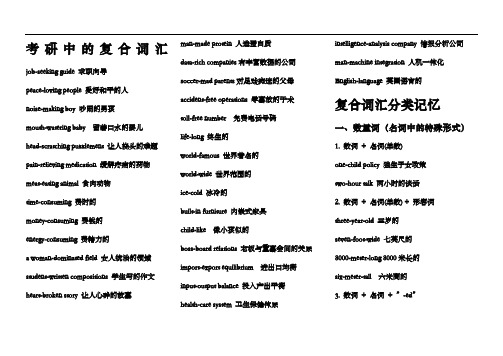
考研中的复合词汇job-seeking guide 求职向导peace-loving people 爱好和平的人noise-making boy 吵闹的男孩mouth-watering baby 留着口水的婴儿head-scratching puzzlement 让人挠头的难题pain-relieving medication 缓解疼痛的药物meat-eating animal 食肉动物time-consuming 费时的money-consuming 费钱的energy-consuming 费精力的a woman-dominated field 女人统治的领域student-written compositions 学生写的作文heart-broken story 让人心碎的故事man-made protein 人造蛋白质data-rich companies有丰富数据的公司soccer-mad parents对足球痴迷的父母accident-free operations 零事故的手术toll-free number 免费电话号码life-long 终生的world-famous 世界著名的world-wide 世界范围的ice-cold 冰冷的built-in furniture 内嵌式家具child-like 像小孩似的boss-board relations 老板与董事会间的关系import-export equilibrium 进出口均衡input-output balance 投入产出平衡health-care system 卫生保健体系intelligence-analysis company 情报分析公司man-machine integration 人机一体化English-language 英国语言的复合词汇分类记忆一、数量词(名词中的特殊形式)1. 数词+ 名词(单数)one-child policy 独生子女政策two-hour talk 两小时的谈话2. 数词+ 名词(单数) + 形容词three-year-old 三岁的seven-foot-wide 七英尺的8000-meter-long 8000米长的six-meter-tall 六米高的3. 数词+ 名词+ ”-ed”one-eyed 独眼的four-storeyed 四层的two-faced 两面的four-footed 四只脚的二.形容词(或者副词)+XX= 名词(不适用于副词),名词ed,形容词,现在分词,过去分词, 介词1.形容词+名词domestic-relations lawyer 家庭关系律师low-level construction 低水平建设hard-line party 强硬路线的政党first-class service一流的服务full-time student 全职学生、脱产学生high-class高级的second-hand二手的part-time业余的mid-term 期中的final-term期末的2. 形容词+ 名词+ “-ed”tight-lipped 很少说话的,守口如瓶的light-hearted轻松愉快的quick-witted 急智的,机敏的good-natured 和蔼的,和善的kind-hearted 好心肠的cold-blooded 冷血的warm-hearted 热心肠的blue-eyed 蓝眼睛的middle-aged 中年的red-lipped 红嘴唇的3. 形容词(副)+现在分词long-standing traditions 长期的传统far-reaching influence 深远的影响ever-changing world 不断变化的世界best-selling novel 最畅销的小说good-looking 长相好看的ugly-looking 长相丑陋的easy-looking 长相随和的tired-looking 面容疲劳的hard-working 勤奋的ever-lasting 永恒的4.形容词/副词+过去分词clear-cut distinctions 鲜明的区别clean-cut hair-style 整齐的发型ready-made 现成的old-fashioned 老式的native-born 本国出生的new-born 新生的so-called 所谓的hard-won 来之不易的well-dressed 衣着好的newly-built 新建的recently-built 刚建的5.形容(副)词+ 形容词dark-blue 深蓝的light-green 浅绿的all-round 全面的red-hot 灼热的6.形容词+ 介词back-up a.后备的; n.备份ill, well专题以ill-为前缀的复合形容词,在考研英语中出现了7次,以well-为前缀的出现了24次,这说明这两个词,派生能力很强,我们要重点掌握。

是否应该强制卫生工作者接种疫苗的英语作文全文共10篇示例,供读者参考篇1Should healthcare workers be required to get vaccinated? This is a hot topic these days and everyone seems to have an opinion on it.Some people think that healthcare workers should definitely be required to get vaccinated. They say that healthcare workers are in close contact with sick people all the time, so it's important for them to be protected from getting sick themselves. By getting vaccinated, healthcare workers can help prevent the spread of diseases to their patients and coworkers.On the other hand, some people believe that healthcare workers should not be forced to get vaccinated. They say that everyone should have the right to make their own choices about their health. Some people might have religious or personal beliefs that prevent them from getting vaccinated, and it wouldn't be fair to force them to go against those beliefs.In my opinion, I think that healthcare workers should be required to get vaccinated. It's a part of their job to keep peoplehealthy, so they should do everything they can to prevent the spread of diseases. Plus, vaccines are safe and effective in preventing illness. It's important for healthcare workers to lead by example and show others that getting vaccinated is the best way to protect yourself and others.In conclusion, I believe that it is important for healthcare workers to get vaccinated in order to protect themselves, their patients, and their coworkers. By getting vaccinated, they can help prevent the spread of diseases and keep everyone safe and healthy.篇2Should healthcare workers be required to get vaccinated?Hey guys, today we’re gonna talk about whether healthcare workers should be forced to get vaccinated. I know it’s a big topic right now with the whole COVID-19 thing going on. Some people think that it’s important for healthcare workers to get vaccinated to protect themselves and their patients. Others think that it should be their choice.First off, getting vaccinated is super important because it can help prevent the spread of diseases like COVID-19. Healthcare workers are in close contact with sick people every day, so ifthey’re not vaccinated, they cou ld easily catch the virus and pass it on to others. Plus, getting vaccinated can protect healthcare workers from getting seriously ill themselves.But some people say that forcing healthcare workers to get vaccinated is not fair. They think that everyone should have the right to make their own choices about their bodies. They also worry about the safety of vaccines and possible side effects.In my opinion, I think that healthcare workers should be required to get vaccinated. They have a responsibility to keep themselves and their patients safe. Plus, vaccines have been proven to be safe and effective in preventing diseases. It’s a small price to pay for the health and safety of everyone around us.So, what do you guys think? Should healthcare workers be forced to get vaccinated? Let me know in the comments!篇3Should healthcare workers be required to get vaccinated? I think so!First of all, getting vaccinated is super important because it helps protect us and the people around us from getting sick.Healthcare workers are in contact with sick people all the time, so it's especially important for them to get vaccinated to prevent spreading any diseases.Secondly, vaccines are safe and effective. They have been tested and approved by experts, so we can trust that they will help keep us healthy. By getting vaccinated, healthcare workers can protect themselves and their patients from dangerous illnesses.Some people might say that it's their choice whether or not to get vaccinated, but I think that when you work in healthcare, you have a responsibility to do everything you can to keep people safe. Getting vaccinated is just one way to do that.In conclusion, I believe that healthcare workers should be required to get vaccinated. It's a small step to take to protect ourselves and others from getting sick, and it shows that we care about the well-being of everyone around us. Let's all do our part to stay healthy and keep each other safe!篇4Should healthcare workers be forced to get vaccinated against COVID-19? This is a big question that has been debated a lot lately. Let's take a closer look at both sides of the argument.On one hand, some people think that all healthcare workers should be required to get vaccinated. They say that since healthcare workers are in contact with sick patients all the time, it's important to make sure they are protected against the virus. By getting vaccinated, healthcare workers can reduce the risk of spreading the virus to patients, colleagues, and their own families. This can help prevent the spread of the virus and save lives.On the other hand, some people believe that forcing healthcare workers to get vaccinated is not fair. They say that everyone has the right to make their own decisions about their own bodies. Some healthcare workers may have concerns about the safety or effectiveness of the vaccines, or they may have personal or religious beliefs that prevent them from getting vaccinated. Forcing them to get vaccinated could violate their rights and lead to resentment and resistance.In my opinion, I think that healthcare workers should strongly consider getting vaccinated against COVID-19. Even though it's important to respect individual rights, the safety and well-being of patients should always come first. By getting vaccinated, healthcare workers can protect themselves, theirpatients, and their loved ones. It's a responsible choice that can help us all move closer to ending the pandemic.So, should healthcare workers be forced to get vaccinated? While it's a difficult question with strong arguments on both sides, I believe that the benefits of vaccination outweigh the risks. It's a small sacrifice to make for the greater good. Let's all do our part to keep each other safe and healthy. Stay well, everyone!篇5Hey guys, today I want to talk about whether healthcare workers should be required to get vaccinated.First of all, getting vaccinated is super important because it helps protect us from getting sick. Vaccines teach our bodies how to fight off germs that can make us very sick. And if healthcare workers aren't vaccinated, they could get sick themselves and then spread the germs to the people they are supposed to be taking care of. That's not good at all!Plus, healthcare workers are around sick people all the time, so it's extra important for them to stay healthy. If they don't get vaccinated, they could accidentally make other people sick too, and that's not fair.Some people might say that it should be a personal choice whether or not to get vaccinated. But when it comes to healthcare workers, it's not just about them – it's about protecting the patients they take care of. We should all do our part to keep each other safe and healthy, right?So, I definitely think that healthcare workers should be required to get vaccinated. It's the best way to keep everyone safe and make sure that we stay healthy. Let's all do our part to fight off germs and stay strong together!篇6Should healthcare workers be required to get vaccinated? Well, I think they should! Because vaccines can help keep them, their patients, and their families safe from getting sick.First of all, healthcare workers are in contact with sick people all the time. So if they don't get vaccinated, they could easily get sick themselves and spread the illness to others. That's not good for anyone! Plus, if a healthcare worker gets sick, they might have to stay home from work, which could leave their patients without proper care.Secondly, healthcare workers have a responsibility to protect the health and well-being of their patients. By getting vaccinated,they can prevent the spread of dangerous diseases like the flu, measles, and COVID-19. This is especially important for patients who are already sick or have weakened immune systems and are more vulnerable to infections.Lastly, getting vaccinated is not only about protecting themselves and their patients, but also about setting a good example for the community. If healthcare workers show that they believe in the safety and effectiveness of vaccines, it can help build trust in the healthcare system and encourage others to get vaccinated too.In conclusion, I believe that it is important for healthcare workers to be required to get vaccinated. Not only does it help protect them, their patients, and their families, but it also plays a crucial role in preventing the spread of infectious diseases and promoting public health. Let's all do our part to stay healthy and safe!篇7Should healthcare workers be required to get vaccinated? That's a big question that has been debated a lot lately. Some people say yes, because it helps keep everyone safe from getting sick. But others say no, because they think it's a personal choice.I think that healthcare workers should be required to get vaccinated. Why? Because they work with sick people every day, and if they aren't vaccinated, they could spread diseases to their patients. That's not good! We want our doctors and nurses to be healthy so they can take care of us when we're sick.Some people might say that it's their own body, so they should be able to decide if they want to get vaccinated or not. But when you work in healthcare, it's not just about you. It's about the people you're taking care of. We need to think about the greater good and do what's best for everyone.So, in my opinion, healthcare workers should be required to get vaccinated. It's important to keep everyone safe and healthy, especially when it comes to taking care of sick people. Let's all do our part to stop the spread of diseases and protect each other.篇8Should healthcare workers be required to get vaccinated? I think yes, because it's important to keep everyone safe and healthy.First of all, getting vaccinated can prevent the spread of diseases. Healthcare workers are in contact with sick people all the time, so if they are not vaccinated, they could pass thedisease on to others. By getting vaccinated, they can protect themselves and their patients from getting sick.Secondly, vaccines are safe and effective. They have been tested and proven to work in preventing diseases. By getting vaccinated, healthcare workers can protect themselves from getting sick and also protect their families and friends.Lastly, getting vaccinated is part of the job. Healthcare workers have a responsibility to take care of their patients and prevent the spread of diseases. By getting vaccinated, they are doing their part to keep everyone safe.In conclusion, I believe that healthcare workers should be required to get vaccinated. It's important for their own health, the health of their patients, and the health of the community. So let's all do our part and get vaccinated!篇9Should healthcare workers be required to get vaccinated?Hi guys! Today I want to talk about whether healthcare workers should be required to get vaccinated. I know it's a big topic right now with all the talk about COVID-19 and vaccines. Some people think that healthcare workers should definitely berequired to get vaccinated to protect themselves and their patients. But others think it should be a personal choice. Let's discuss both sides!First of all, let's talk about why some people think healthcare workers should be required to get vaccinated. They say that healthcare workers are in contact with sick people all the time, so it's important for them to be protected. Getting vaccinated can help prevent the spread of diseases in hospitals and other healthcare settings. It's like wearing a seatbelt to keep safe while driving - getting vaccinated is a way to protect yourself and others.On the other hand, some people think that healthcare workers should have the right to choose whether or not to get vaccinated. They say that everyone has the right to make decisions about their own body. Plus, some people have concerns about the safety of vaccines and worry about possible side effects. So they think that it should be up to each individual to decide whether or not to get vaccinated.In my opinion, I think that healthcare workers should be required to get vaccinated. It's important for them to protect themselves and their patients from getting sick. Plus, vaccines have been proven to be safe and effective in preventing diseases.So I think it's a good idea for healthcare workers to get vaccinated.In conclusion, I think that requiring healthcare workers to get vaccinated is a good idea to protect their health and the health of their patients. It's like wearing a helmet while riding a bike - it's a simple way to stay safe and prevent accidents. So let's all do our part to stay healthy and keep others safe! Thank you for listening!篇10Should healthcare workers be required to get vaccinated? This is a question that has sparked a lot of debate and controversy. Some people believe that healthcare workers should be required to get vaccinated in order to protect themselves, their patients, and the community as a whole. Others argue that mandating vaccines goes against personal freedoms and individual rights.In my opinion, I think that healthcare workers should be required to get vaccinated. This is because healthcare workers are in direct contact with sick patients on a daily basis, and they have a higher risk of being exposed to infectious diseases. Bygetting vaccinated, healthcare workers can protect themselves from getting sick and spreading the disease to others.Not only that, but healthcare workers also have a responsibility to protect their patients. By getting vaccinated, they can reduce the risk of passing on infections to vulnerable patients who may already be sick or have weakened immune systems. In this way, healthcare workers not only protect themselves, but also their patients and the community as a whole.Some people may argue that mandating vaccines infringes on personal freedoms and individual rights. However, when it comes to public health, the greater good of society should take precedence. Vaccines have been proven to be safe and effective in preventing the spread of infectious diseases, and mandating vaccines for healthcare workers is a necessary step to ensure the safety and well-being of everyone.In conclusion, I believe that healthcare workers should be required to get vaccinated in order to protect themselves, their patients, and the community. By getting vaccinated, healthcare workers can fulfill their duty to provide safe and effective care to patients, while also preventing the spread of infectious diseases. It is important for everyone to do their part in promoting publichealth and safety, and requiring vaccinations for healthcare workers is a necessary step in achieving that goal.。
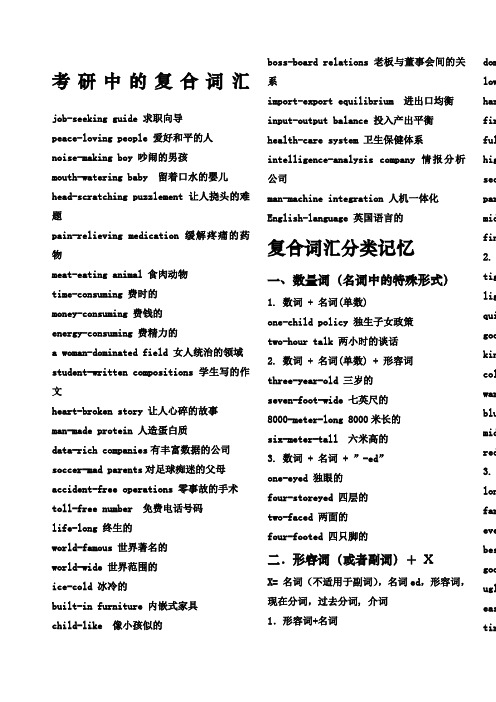
考研中的复合词汇job-seeking guide 求职向导peace-loving people 爱好和平的人noise-making boy 吵闹的男孩mouth-watering baby 留着口水的婴儿head-scratching puzzlement 让人挠头的难题pain-relieving medication 缓解疼痛的药物meat-eating animal 食肉动物time-consuming 费时的money-consuming 费钱的energy-consuming 费精力的a woman-dominated field 女人统治的领域student-written compositions 学生写的作文heart-broken story 让人心碎的故事man-made protein 人造蛋白质data-rich companies有丰富数据的公司soccer-mad parents对足球痴迷的父母accident-free operations 零事故的手术toll-free number 免费电话号码life-long 终生的world-famous 世界著名的world-wide 世界范围的ice-cold 冰冷的built-in furniture 内嵌式家具child-like 像小孩似的boss-board relations 老板与董事会间的关系import-export equilibrium 进出口均衡input-output balance 投入产出平衡health-care system 卫生保健体系intelligence-analysis company 情报分析公司man-machine integration 人机一体化English-language 英国语言的复合词汇分类记忆一、数量词(名词中的特殊形式)1. 数词 + 名词(单数)one-child policy 独生子女政策two-hour talk 两小时的谈话2. 数词 + 名词(单数) + 形容词three-year-old 三岁的seven-foot-wide 七英尺的8000-meter-long 8000米长的six-meter-tall 六米高的3. 数词 + 名词 + ”-ed”one-eyed 独眼的four-storeyed 四层的two-faced 两面的four-footed 四只脚的二.形容词(或者副词)+XX= 名词(不适用于副词),名词ed,形容词,现在分词,过去分词, 介词1.形容词+名词domlowharfirfulhigsecparmidfin2.tigligquigookincolwarblumidred3.lonfarevebesgoougleastirhard-working 勤奋的ever-lasting 永恒的4.形容词/副词+过去分词clear-cut distinctions 鲜明的区别clean-cut hair-style 整齐的发型ready-made 现成的old-fashioned 老式的native-born 本国出生的new-born 新生的so-called 所谓的hard-won 来之不易的well-dressed 衣着好的newly-built 新建的recently-built 刚建的5.形容(副)词 + 形容词dark-blue 深蓝的light-green 浅绿的all-round 全面的red-hot 灼热的6.形容词 + 介词back-up a.后备的; n.备份ill, well专题以ill-为前缀的复合形容词,在考研英语中出现了7次,以well-为前缀的出现了24次,这说明这两个词,派生能力很强,我们要重点掌握。
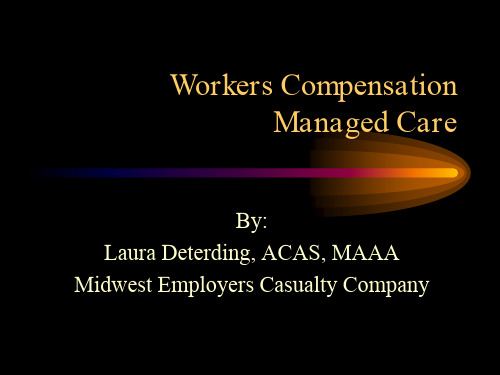
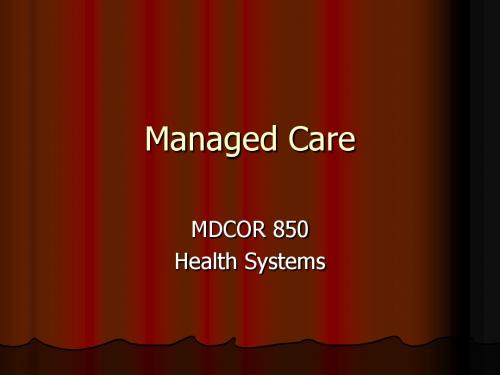
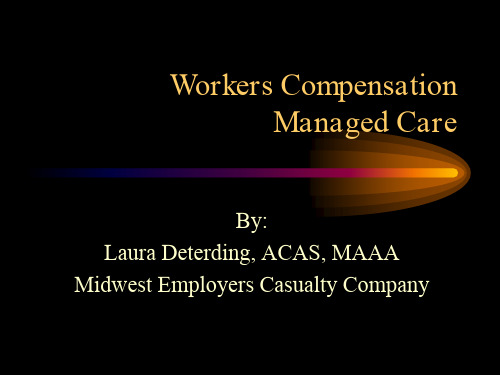
Adjusted gross income(AGI)(调整后毛所得):Total income from all taxable sources less certain expenses incurred in earning that income.Adverse selection (逆向选择):The phenomenon under which the uninformed side of a deal gets exactly the wrong people trading with it (that is, it gets an adverse selection of the informed parties.)Alternative minimum tax(AMT)(替代性最低税):The tax liability calculated by an alternative set of rules designed to force individuals with high levels of preference income to incur at least some tax liability.Asymmetric information(不对称信息):A situation in which one party engaged in an economic transaction has better information about the good or services traded than the other party. Average indexed monthly earnings(AIME)(月均指数化收入):The top 35 years of wages in covered employment, indexed each year for average wage growth. The AIME is used in the computation of an individual’s Social Security benefit.Benefits-received principle受益原则:Consumers of a publicly provided service should be the ones who pay for it.Cap-and-trade(总量控制和交易制度):a policy of granting permits to pollute, with the number of permits set at the desired pollution level, and allowing polluters to trade the permits.Capital gain(loss)资本利得(资本损失):An increase(decrease)in the value of an asset. Capitation-based reimbursement(按人头补偿(报销)制度):A system in which health care providers receive annual payments for each patient in their care, regardless of services actually used by that patient.Charter schools(特许学校):Public schools that operate under special state government charters. Within limits established by their charters, these schools can experiment with a variety of approaches to education and some independence in making their spending and hiring decisions. Coase theorem(科斯定理):provided that transaction costs are negligible an efficient solution to are externality problem is achieved as long as someone is assigned property rights, independent of who is assigned those rights.Commodity egalitarianism(商品平均主义):the idea that some commodities ought to be made available to everyone.Community rating(团体费率法):The practice of charging uniform insurance premiums for people in different risk categories within a community, thus resulting in low-risk people subsidizing high-risk people.Consumption smoothing(消费平滑化):Practice of reducing consumption in high-earning years in order to increase consumption in low-earning years.Cost efficient(成本有效);a policy that achieves a given amount of pollution reduction at the lowest cost possible.Cost-based reimbursement or fee-for service(按费用补偿制度或者一次一付医疗费制度):A system under which health care providers receive payment for all services required.Crowd out(排挤):When public provision of a good (in this case, education)substitutes for private provision of the good. In the presence of crowd out, when the government increases public education in the amount of education is less than the amount provided by the government. Deadweight loss (无谓损失):The waste that exists when trades occur in which marginal cost exceeds marginal benefit, or when trades in which marginal benefit exceeds marginal cost do not take place.Earned income tax credit,EITC(劳动所得税收抵免):A tax credit for low-income individuals Emissions fee(排污费):a tax levied on each unit of pollutionEntitlement programs(公民权利性计划): Programs whose expenditures are determined by the number of people who qualify, rather than preset budget allocations.Equivalent variation等价变化:A change in income that has the same effect on utility as a change in the price of a commodity.Excess burden超额负担:A loss of welfare above and beyond taxes collected. Also called welfare cost or dead-weight loss.Expected Value(期望值):The average value over all possible uncertain outcomes, with each outcome weighted by its probability of occurring.Expenditure incidence(支出归宿):the impact of government expenditure on the distribution of real incomeExternality(外部性):An activity of one entity affects the welfare of another entity in a way that is outside the market.Externality(外部性):an activity of one entity that affects the welfare of another entity in a way that is outside the market mechanism.Flat income tax统一所得税:A tax schedule for which the marginal tax rate is constant throughout the entire range of incomes.Free rider(免费搭车者):the incentive to let other people pay for a public good while you enjoy the benefits.Fully funded(完全积累制):A pension system in which an individual’s benefits are paid out of deposits that have been made during his or her working life, plus accumulated interest.Hospital insurance(HI)(医院保险):Part A component of Medicare that covers inpatient medical care and is funded through a payroll tax.Imputed rent(估算租金):The net monetary value of the services from a dwelling.Income effect(收入效应): The effect of a price change on the quantity demanded due exclusively to the fact th at the consumer’s income has changed.Individual mandates(个人托管)An individual health insurance mandate, a legal requirement that every American obtain adequate private health insurance coverage. People who don't receive such coverage through their employer or some other group would be required to purchase their own individual coverage. Those who failed to do so would be subject to fines or other penalties. Individual Retirement Account(IRA)(个人退休账户):For qualified individuals, a savings account in which the contributions are tax deductible and the interest accrues tax free, provided the funds are held until retirement. On withdrawal, both contributions and accrued interest are subject to tax.In-kind transfer(实物转让):payments from the government to individuals in the form of commodities or services rather than cashInsurance premium (保险费):Money paid to an insurance company in exchange for a guarantee of compensation given a specified adverse event.Inverse elasticity rule反弹性法则:For goods that are unrelated in consumption, efficiency requires that tax rates be inversely proportional to elasticities.Itemized deduction(分项扣除):A specific type of expenditure that can be subtracted from adjusted gross income in the computation of taxable income.Job lock(工作锁定):The tendency for workers to remain in their job in order to keep theiremployer-provided health insurance coverage.Linear income tax schedule线性所得税:See flat income tax.Lock-in effect(锁定效应):The disincentive to change portfolios that arises because an individual incurs a tax on realized capital gains.Lump sum tax一次总付税:A tax whose value is independent of the individual’s behavior. Managed care(管理保健):Any of a variety of health care arrangements in which prices are kept down by supply-side control of services offered and prices charged.Maximum criterion(极大极小准则):social welfare depends on the utility of the individual who has the minimum utility in the societyMedicaid(医疗补助):Federal-and state-financed health insurance program for the poor. Medicare(保险):Federally funded government program that provided health insurance to people aged 65 and over and to the disabled.Moral hazard (道德风险):When obtain insurance against an adverse outcome leads to changes in behavior that increase the likelihood of the outcome.Normal good(正常品): A good for which demand increases as income increases an demand decreases as income decreases, other things being the same.Original position(初始状态):an imaginary situation in which people have no knowledge of what their economic status in society will bePareto efficient(帕累托效率):An allocation of resources such that no person can be made better off without making another person worse off.Pareto improvement(帕累托改进):A reallocation of resources that makes at least one person better off without making anyone else worse off.Pay-as-you-go(unfunded)(现收现付制(非积累制)):A pension system in which benefits paid to current retires come from payments made by current workers.Pigouvian tax(庇古税):a tax levied on each unit of an externality-generator’s output in an amount equal to the efficient level of output。
安全生产法ppt安全生产法是为有效遏制和预防事故的发生,维护劳动者的合法权益,保障生产单位及其员工的安全与健康而制定的法律。
它确立了安全生产的基本原则和重要法律责任,并规定了各方在生产过程中的权利和义务。
安全生产法对实现安全生产的目标具有重要意义。
首先,安全生产法规定了安全生产的基本原则。
它强调了安全第一的原则,即在生产过程中,应优先考虑员工的安全和健康。
此外,安全生产法还规定了预防为主、综合治理的原则,即在开展生产活动时,应采取预防措施,综合治理各种安全风险。
其次,安全生产法规定了各方的责任和义务。
生产单位负有主要责任,应建立健全安全生产管理体系,明确安全生产目标和责任分工。
同时,安全生产法规定了劳动者的权利和义务,强调劳动者应接受安全生产教育和培训,积极参与安全生产活动。
再次,安全生产法规定了各类事故的报告和调查程序。
一旦发生生产安全事故,生产单位应立即报告有关部门,并按照规定开展调查。
重大事故还应进行事故国家忧和事故应急预案。
另外,安全生产法还规定了安全生产执法和监督机制。
相关部门应监督生产单位是否遵守安全生产法律法规,发现违法行为及时处理。
同时,安全生产法还规定了对违法行为的处罚措施,如罚款、责令停产整顿、吊销许可证等。
最后,安全生产法还规定了对事故的赔偿和救助制度。
对于因工作原因受伤或死亡的劳动者,生产单位应及时启动事故责任追究和赔偿程序,并提供必要的生活救助。
综上所述,安全生产法对于保障生产单位和劳动者的安全与健康具有重要意义。
在生产过程中,各方应切实履行安全生产法规定的各项责任和义务,采取预防措施,综合治理安全风险,确保生产安全。
只有通过全面贯彻执行安全生产法,才能更好地维护每个人的合法权益,降低事故的发生率,为企业和社会的可持续发展创造一个安全稳定的环境。
【参考译文】The Safety Production Law is a law enacted to effectively curb and prevent accidents, protect the legitimate rights and interests of workers, and ensure the safety and health of production units and their employees. It establishes the basic principles of safety production and important legal responsibilities, and specifies the rights and obligations of all parties in the production process. The Safety Production Law is of great significance to achieving the goal of safety production.Firstly, the Safety Production Law stipulates the basic principles of safety production. It emphasizes the principle of safety first, which means that the safety and health of employees should be given priority in the production process. In addition, the Safety Production Law also stipulates the principle of prevention first and comprehensive governance, which means that preventive measures should be taken and various safety risks should be comprehensively managed during production activities.Secondly, the Safety Production Law stipulates the responsibilities and obligations of all parties. Production units bear the main responsibility and should establish a sound safety production management system, clarify safety production goals and divisionof responsibilities. At the same time, the Safety Production Law stipulates the rights and obligations of workers, emphasizing that workers should receive safety production education and training and actively participate in safety production activities.Furthermore, the Safety Production Law stipulates the reporting and investigation procedures for various types of accidents. Once a production safety accident occurs, the production unit should immediately report to the relevant departments and carry out investigations in accordance with regulations. Major accidents should also be subject to national accident reassessment and emergency response plans.In addition, the Safety Production Law also stipulates the law enforcement and supervision mechanism for safety production. The relevant departments should supervise whether production units comply with safety production laws and regulations, and handle illegal activities in a timely manner. At the same time, the Safety Production Law also stipulates penalties for illegal activities, such as fines, orders to suspend production for rectification, and revocation of permits.Finally, the Safety Production Law also stipulates the compensation and relief system for accidents. For injured or deceased workers due to work-related reasons, the production unit should promptly initiate accident liability investigation andcompensation procedures and provide necessary living assistance. In conclusion, the Safety Production Law is of great significance in ensuring the safety and health of production units and workers. In the production process, all parties should fulfill their responsibilities and obligations stipulated by safety production laws and regulations, take preventive measures, comprehensively govern safety risks, and ensure production safety. Only by fully implementing the Safety Production Law can we better safeguard the legitimate rights and interests of everyone, reduce the occurrence of accidents, and create a safe and stable environment for the sustainable development of enterprises and society.。
EIT基本守则中英文对照1。
自由选择的雇佣关系1.1不可使用强制劳动力、受关押劳动力和不情愿的犯人劳动力。
1。
2雇员不应被要求交纳抵押金或把他们的身份证件交给雇主,在给出合理的预先通知之后,雇员可以自由地离开其雇主。
2.尊重结社自由和工会代表劳方进行劳资谈判的权力2.1所有雇员毫无例外地具有加入或组成其自己选择的工会的权力和进行集体劳资谈判的权力。
2。
2雇主对于工会的行为和他们的组织活动,要采取开放的态度。
2。
3不能歧视职工代表,这些代表可以利用其工作场所执行其职工代表的职能。
2。
4在自由结社和劳资谈判的权力受法律限制的地方,雇主要促进而不是防碍建立独立自由的结社和劳资谈判的类似形式。
3。
安全卫生的工作条件3。
1要提供安全卫生的工作环境,并要考虑到该行业的普遍常识和任何特殊危险性。
要采取适当的措施,防止由于工作引起的、与工作有关的或在工作中发生的各种事故及损害健康事件的发生.尽可能而又实际地减少工作环境中固有的各种危险因素。
3.2应对雇员进行定期的和有记录的健康和安全培训,这种培训对于新的和改换工种的雇员要重复进行.3。
3要为雇员提供清洁的厕所设施和饮用水,在可能的情况下,还要提供存放食品的卫生设备。
3.4所提供的住宿条件,要保证清洁、安全并且满足雇员的基本需求.3.5采用本法规的公司,应该指定一名高级管理人员代表对健康和安全负责。
4.不可使用儿童作工4。
1不能再新招收儿童作工4。
2所有公司要制订或参与并资助使任何被发现用作童工的儿童接受高质量教育直至不再是儿童为止的政策和项目。
儿童和儿童作工的定义在附录中给出.4.3不可雇用儿童和 18 岁以下青少年在夜间或在危险的条件下工作。
4。
4这些政策和程序必须与相关的 ILO 标准条款一致。
5。
维持生活的工资5.1每个标准工资周所付的工资和福利,至少要达到国家的法定标准或行业规定的标准,以高者为准。
在任何情况下,所付工资总应足够满足基本需求并提供一些可供自由支配的收入。